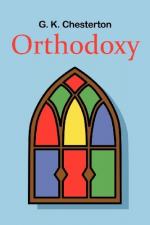
|
| Name: _________________________ | Period: ___________________ |
This test consists of 5 multiple choice questions, 5 short answer questions, and 10 short essay questions.
Multiple Choice Questions
1. What moment does Chesterton point to as the single instant when God appeared to be atheist?
(a) When the first person, Abel, was murdered.
(b) When Christ was abandoned on the cross.
(c) When he had to send the Flood to wipe out most of humanity.
(d) When Eve fell into sin.
2. According to Chesterton, how did men gain morality?
(a) By consciously working out a moral code.
(b) By safe-guarding their culture.
(c) By safe-guarding their religion.
(d) By teaching tradition to their children.
3. Why does Chesterton say that miracles are eminently desirable?
(a) Man can triumph over nature's cruelty.
(b) Miracles give people a glimpse of the supernatural.
(c) Religious people have the opportunity to prove their beliefs.
(d) Man can begin to understand God.
4. In Chesterton's argument, why can the orthodox man believe in revolution?
(a) Revolution coincides with orthodoxy.
(b) It's a trick question - he cannot.
(c) Orthodoxy manifests itself as revolution.
(d) Revolution means restoration.
5. What is the enormous mistake of the modern age, according to Chesterton?
(a) It espouses a weak version of Christianity.
(b) It does not look to God to answer its questions.
(c) It is changing the ideal rather than reality.
(d) It does not believe strongly enough in progress.
Short Answer Questions
1. What was Chesterton's early progression through religious mindsets?
2. In the Christian's view, why does a man's soul provide enough outlet for both the optimist and the pessimist?
3. What is Pimlico?
4. Why does Chesterton say that any discussion about the creation/sustaining principle in the world must be metaphorical?
5. What oddity does Chesterton find in the modern world?
Short Essay Questions
1. Why are liberals not free thinkers? What argument is made in Chapter VIII, The Romance of Orthodoxy, about confusion within language?
2. If Nature does improve man through impersonal means, as Chesterton claims, what must happen? What is happening in reality?
3. What is the first time that Chesterton felt he had stumbled onto a path that was familiar to some? How did Christianity mirror his own thoughts?
4. As Chesterton argues, why does love seek individuality and personality? Is this true only in relation to man or also in relation to God?
5. Christianity holds that any man who depends on a luxurious life is fallen and corrupt. What effect does this belief have on the believer, according to Chesterton?
6. What are the pagan and Christian view of virtue? What is Chesterton's view of them?
7. In Chapter VI, The Paradoxes of Christianity, what does Chesterton name the most common type of trouble in the world? How does Christianity answer this trouble?
8. Near the beginning of Chapter VII, The Eternal Revolution, Chesterton makes an argument concerning superiority. What is this argument? Does he satisfy the question fully?
9. Why is it better to be a progressive, according to Chesterton's understanding of the term? Why should man rebel against the new rather than against the old?
10. Chesterton says that the primary evil with the pessimist is that he does not love what he chastises. How is this true?
|
This section contains 1,710 words (approx. 6 pages at 300 words per page) |

|




